Bridge Calls On Government To Start Counting Referendum Signatures
ZAGREB, 17 Feb 2022 - The Bridge party called on the government and Public Administration Minister Ivan Malenica on Thursday to count the 410,000 signatures the party collected for a referendum against COVID certificates and the national COVID crisis management team.
A representative of the referendum petitions, Iva Rem, told the press the signatures were delivered to parliament on 24 January and that nothing had happened since.
Bridge MP Marin Miletić said Malenica announced yesterday the counting would take 15 to 30 days. "I once again call on Malenica not to engage in shady deals, not to play games of deception. They need to organize the people and count those signatures."
He said 410,000 citizens requested a referendum and that if Prime Minister Andrej Plenković and "his gang" respect democracy and democratic processes, they will count the signatures and ensure the citizens' right to a referendum.
Miletić said "there is no reason for nervousness" in the government, "notably when you have citizens before you who want a referendum."
Living-away-from-home allowance for MPs should be objectively regulated
Asked if MPs should continue to get the living-away-from-home allowance, he said it was not the same if an MP lives in Split or Dubrovnik and comes to Zagreb for work three or four times a week and if an MP lives in Zagreb and gets to work in five or 15 minutes.
"I'm for everything to be regulated and objectively defined, and Croatian citizens should know what each MP does, how much they work, and what the scope of their work is," Miletić said. "Some of us are in the field on weekends even, some of us have crossed 49,000 kilometers by car in eight months and are doing their job properly."
For more, check out our politics section.
Parliament Asks Gov't to Verify Signatures for Anti-COVID Referendum
ZAGREB, 11 Feb 2022 - Parliament on Friday asked the government to verify the number and authenticity of the signatures collected for the Bridge party's referendum petitions to abolish COVID certificates and the crisis management team, and to include at least two representatives of each petition in the process.
The government was also asked to check if all the signatures were collected in line with the Referendum Act.
Parliament passed the relevant conclusions, proposed by the Committee on the Constitution, with 77 votes, while 32 MPs were against and 13 abstained.
Before the vote, parliament rejected amendments by Bridge and the Social Democratic Party to ask the State Electoral Commission, rather than the government, to verify the signatures in 30 days and the SDP proposal to establish a parliamentary task force, comprising three members from the opposition and four from the majority, to supervise the count.
Speaker Gordan Jandroković said recently he could not say how much the verification would take and that once the signatures had been counted, the process was back in parliament's hands.
If it is established that Bridge collected enough signatures, parliament can either call a referendum or ask the Constitutional Court to assess the referendum questions.
Bridge delivered the signatures to parliament on 24 January, saying they had collected 410,533 for the petition against COVID certificates and 409,219 against the national COVID crisis management team, more than the 368,867 required (10% of eligible voters) for a referendum to be called.
Bridge calls out majority for not allowing State Electoral Commission to count votes
Before today's vote, MP Marin Miletić of Bridge called out the ruling majority for not allowing the State Electoral Commission to count votes because "everyone would be sure in that case."
He appealed to the majority's conscience during the vote, telling them not to be afraid of citizens and to allow the referendum.
For more, check out our politics section.
Two Referendum Initiatives Initiated by Bridge Party Cost Roughly €57,000
ZAGREB, 3 Jan 2022 - The organizing committees for two referendum petitions initiated by the Bridge party cost a total of HRK 428,300 (€57,106), the organizers revealed on Monday.
The cost of the collection of signatures for the referendum petitions was capped at HRK 8 million each.
From 4 to 18 December, the Bridge party collected signatures at over 1,200 venues across Croatia for the two referendum petitions: one for the transfer of the powers of the national COVID-19 crisis management team to the parliament, where all decisions concerning COVID crisis management should be approved by a two-thirds majority, and the other one for the abolition of COVID passes.
The referendum activities lasted from 2 December to 2 January, the organizers said on Monday.
The costs include the lease of venues, banking services, transport, advertisement, printing services, etc.
The costs incurred for the initiative to have COVID certificates revoked stand at HRK 203,700.
The organizers said they had raised 205,000 in donations for the initiative to rescind COVID certificates. The bulk of that amount, or HRK 170,000, was provided by the Bridge party, whereas citizens Ivan Pehar and Željko Ilijašević donated HRK 30,000 and HRK 5,000 respectively.
According to the organizers, HRK 224,600 was spent on the initiative for the transfer of the powers of the national COVID-19 crisis management team to the parliament.
The donations for this purpose came to HRK 218,800, with Bridge itself donating HRK 180,000. Furthermore, individuals donated amounts ranging from HRK 50 to HRK 30,000, the maximum amount that can be donated by an individual in a referendum initiative.
When this opposition party started collecting signatures, the Justice and Public Administration Ministry established that the minimum required number should be 368,446 valid signatures, that is 10% of the country's electorate.
Bridge leader Božo Petrov told a news conference on 23 December that the party had collected about 400,000 signatures and that the boxes with the signatures would be delivered to the national parliament on 24 January.
(€1 = HRK 7.5)
For more, check out our politics section.
Grmoja: Bridge Has Collected Enough Signatures for its Anti-COVID Referendum Petition
ZAGREB, 20 Dec 2021 - Nikola Grmoja of the Bridge party said on Sunday they had collected a sufficient number of signatures for their referendum petitions for the transfer of the powers of the national COVID-19 crisis management team to the parliament and the abolishment of COVID certificates.
This opposition party started collecting signatures on 4 December at over 1,200 venues across Croatia, and the two-week deadline for the initiative expired at midnight on 18 December.
For a referendum campaign to be successful, its organizers must collect the signatures of 10% of the electorate or 368,446 signatures.
Grmoja, however, stopped short of specifying the number of collected signatures, and in his statement to Hina on Sunday evening, he said that they were still gathering data and information from the ground and from local teams that had collected signatures in the last 14 days.
The results of the referendum campaign of this Opposition party are expected to be known on Wednesday.
On Saturday, the last day of the campaign, Grmoja said that data on the turnout from all signature-collecting points should be known by Wednesday, claiming that in the last two days of the campaign, on Friday and Saturday, the turnout was excellent.
Last Wednesday, he told a news conference that they had collected around 300,000 signatures, and in a bid to encourage as many people as possible to sign the petition, senior Bridge members joined the party activists on the ground collecting signatures.
In the event that the referendum petition had been supported by the required number of signatures, the questions proposed for the referendum could be also tested by the Constitutional Court.
President Milanović on the referendum
On 6 December, Croatian President Zoran Milanović said that he wouldn't sign the Bridge party's referendum petition for the abolition of COVID certificates because he thought he "isn't here to root for anyone", and he told the government and the ruling Croatian Democratic Union (HDZ) party that they had brought this on themselves.
"I have said I will not sign it, but what I'm saying carries at least as much weight as some signature. I believe the government and the HDZ are responsible for signatures being collected now for amending the Constitution so that what is clear to everyone, except to the HDZ and Plenković, could become clear to them as well," said Milanović.
Commenting on the referendum on that occasion, Milanović said it consisted of two parts, the first of which was a matter of constitutionality with regard to Article 17, or cases when it is decided on a temporary suspension of fundamental human rights and freedoms. According to him, the first part of the referendum will depend on whether enough signatures are collected, and if there are enough of them, then the referendum will likely succeed because those in favor of the crisis management team running Croatia, and they're about 25% of them, he says, will simply not cast their vote or their number will be insufficient.
"I think the second part of the referendum, which deals with legislative changes, is not very well though-out and... the Constitutional Court may not allow those referendum questions," he said then.
Four opposition groups say they never supported Bridge's referendum initiative
Last Thursday, MPs from the Green-Left Bloc, Centre/GLAS, Peasant Party /Workers' Front, and Istrian Democratic Party groups strongly denied the statement by the Bridge's Vice President Grmoja that he had received guarantees from all opposition parties that they would support Bridge's referendum petition.
"That statement is a complete lie," says a joint statement signed by the leaders of the four opposition groups, stressing that these parties "neither participated in the meeting on the referendum initiative nor pledged their support in any way."
"It is unclear why MP Grmoja told such lies. ... Some members of our groups have warned Bridge MPs several times that the referendum initiative will further divide citizens, mobilize anti-vax sentiment, help spread fake news and conspiracy theories, and potentially contribute to the escalation of violence among citizens," the joint statement said.
The statement was released the day after in the national parliament Bridge deputies entered into a conflict with Opposition lawmakers from the Social Democratic Party (SDP) and other center-left groups on the topic of vaccination against coronavirus.
For more on politics, follow TCN's dedicated page.
For more on COVID-19, follow TCN's dedicated page.
Results of MOST Party Referendum Campaign To Be Known Wednesday
ZAGREB, 19 Dec, 2021 - The results of the MOST party's referendum campaign against COVID-19 certificates are expected to be known on Wednesday, according to the Jutarnji List daily issue of Sunday.
Bridge vice-president Nikola Grmoja has said that data on the turnout from all signature-collecting points should be known by then, claiming that in the last two days of the campaign, on Friday and Saturday, the turnout was excellent.
For a referendum campaign to be successful, its organisers must collect the signatures of 10% of the electorate, or 368,446 signatures.
Earlier this week, the party estimated that it had collected around 300,000 signatures, and in a bid to encourage as many people as possible to sign the petition, senior Bridge members joined the party activists on the ground collecting signatures.
For more on politics, follow TCN's dedicated page.
For more about Croatia, CLICK HERE.
Zagreb Gay Pride 2021 Analysis: Issues Still Exist, Pride Celebrates History and Present Equality
July 5, 2021 - Gay rights in Croatia still have challenges ahead, but even if all problems are resolved, Pride should remain a commemorative event. A look at the history of gay culture in Croatia and the current climate in this Zagreb Gay Pride 2021 Analysis by TCN reporter Ivor Kruljac.
Zagreb Pride is the oldest pride in Croatia. First held in 2002, it attracts more and more people every year, from LGBTQ members, straight people that support gay rights to NGOs, human rights activists, and even politicians from the left and liberal specter. Over the years, the event grew from a one-day pride to Pride month, full of educational and entertaining events regarding LGBTQ issues and a chance for people with the same preferences to meet and celebrate who they are.
Pride month is marked in June in honor of the 1969 Stonewall Uprising in Manhattan.
„The Stonewall Riots, also called the Stonewall Uprising, began in the early hours of June 28, 1969, when New York City police raided the Stonewall Inn, a gay club located in Greenwich Village in New York City. The raid sparked a riot among bar patrons and neighborhood residents as police roughly hauled employees and patrons out of the bar, leading to six days of protests and violent clashes with law enforcement outside the bar on Christopher Street, in neighboring streets, and in nearby Christopher Park. The Stonewall Riots served as a catalyst for the gay rights movement in the United States and around the world“, reminds History.com.
When it comes to LGBTQ in Croatia, as you can expect with the ideological divide Croatians generally experience, there are mixed feelings on the issue.
From street violence to a family event
Participating in the first Pride in 2002 required that if you are a man loving a man ready to openly admit it, you had to have balls.
The attacks by skinheads and other „morally concerned citizens were fierce and violent. Participants truly needed police protection which was provided but also needed to be careful to not get hit by the incoming rocks that were thrown among the participants.
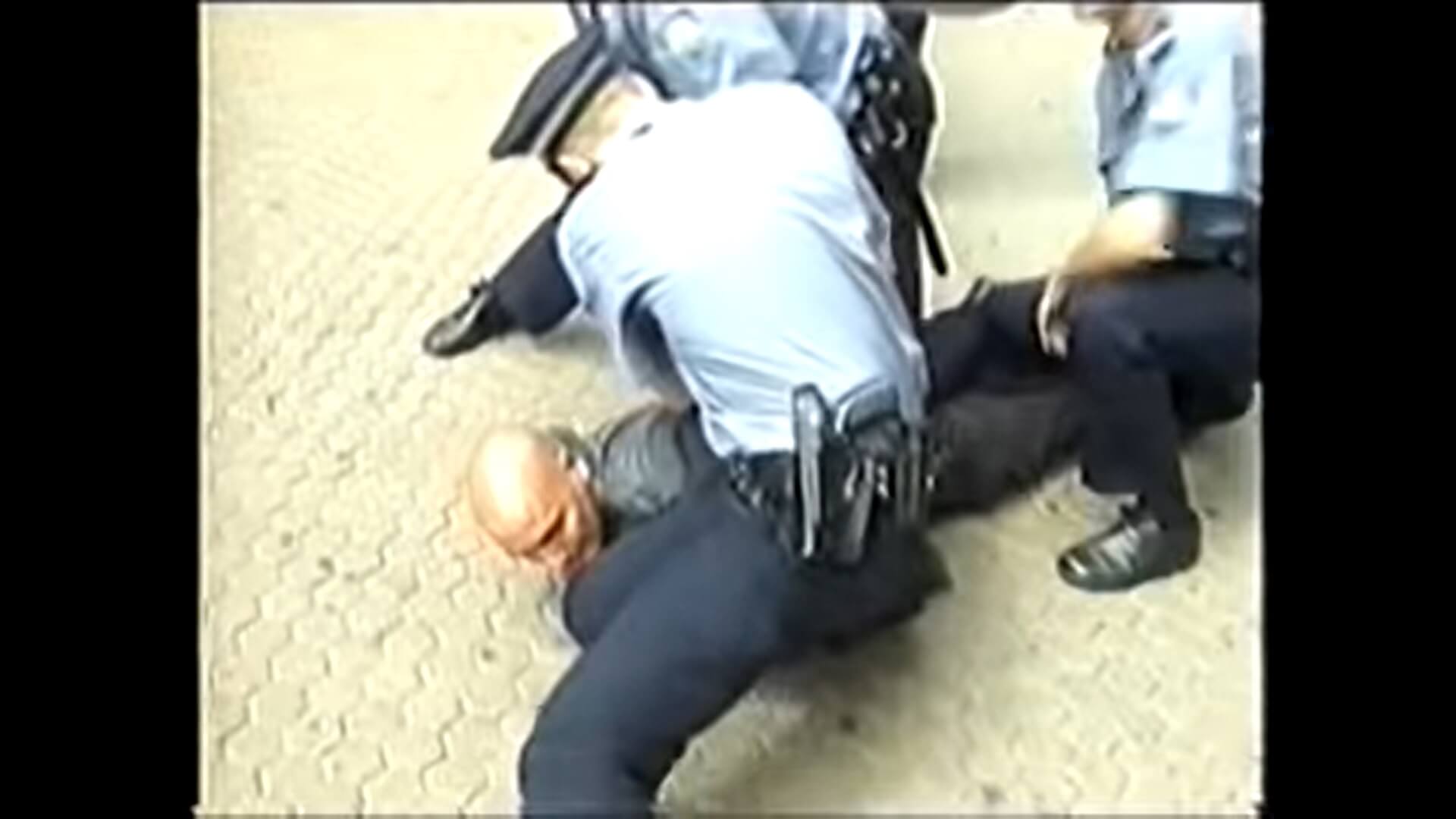
Police arresting violent skinhead at the first Zagreb Pride in 2002, screenshot / Zagreb pride
But, at least for Zagreb, the situation got better and more open. Today, pride is the forthcoming celebration of love and freedom, and entire families can be seen to join the picnic at Ribnjak park to teach their children tolerance and that people are not sick or different from others because of their sexual preference. Other larger cities in Croatia, such as Split, slowly but surely, do follow that path too, and Rijeka, the pinnacle of liberal Croatia, is also a very gay-friendly city.
Of course, a political counterstrike is expected and quite strong. The first most notable one was the 2013 referendum, where it was voted that the Croatian constitution declares marriage as a „community between a man and woman“. The goal was to deny LGBTQ couples the same rights as enjoyed by straight people.
However, the bill on life partnership outplayed that attempt.
In the meantime, LGBTQ couples can also adopt children in Croatia, as Constitutional Court concluded that gay couples fostering children is not against the Croatian Constitution.
That decision and along with the general openness of Croatia towards LGBTQ was followed by a controversial carnival in Imotski where an effigy of a gay couple was burned. President Zoran Milanović demanded an apology from the organizers, and SDP's MP Arsen Bauk filed charges against the organizers.
Counting pluses and minuses, the report on Croatia being the 39th best country for LGBTQ visitors still seems to uphold. No changes for the better, but at least Croatia is still in the top third for this category of tourists.
Haters strike back
2020 and 2021 sadly saw the uprise of violence towards LGBTQ in the Croatian capital. Apart from the occasional tearing down or burning of the rainbow flag, Croatia was shocked with an attempt of burning a man in Maksimir Forest Park as well, with his sexual preference being the sole motive for the attack.
On the other side, this year's pride felt to start stronger than ever. The newly elected mayor Tomislav Tomašević joined the parade, along with stating that Zagreb is a city that is open to everyone. This year arranged a bit differently to adhere to corona measures; around 2500 participated in the event.
„Twenty of our prides made our city and our republic a better, more democratic, and joyous place for the life of all citizens“, was the main message of the 20th edition of Zagreb Pride.
As reported by Index.hr, the Zagreb Pride association representatives stated that the Croatian LGBTIQ community „became a powerful, responsible and self-aware part of the country, but that the fight isn't over“.
„Our constitution and our laws still do not include in a complete and fair way. Our streets and squares are still not free of hate. We didn't forget nor we will forget victims of homophobic and fascist rampage in this year and all previous years“, stated Zagreb Pride.
Sadly, while Pride itself went without issues, participants of the pride who walked the streets of Zagreb after pride with rainbow flags faced a series of physical attacks on several locations in Zagreb.
A week ahead of Pride, conservative MOST Party parliament member Nikola Grmoja complained that commercials displayed during EURO 2020 commercials were LGBTQ propaganda and that kids need to be protected from it and announced that he might include it in his anti-pedophile package. Grmoja's statement caused strong disagreements among the Croatian public, with several people (including celebrities) teasing him that if he wants to start battling pedophilia, he should start from church (as Grmoja is quite clerical). Božo Petrov, president of the MOST party, added more fuel to the fire when he supported Grmoja, stating that „minorities can't dictate what my children can learn in school“. He added that minorities need to be aware that they are minorities and that „we tolerate that," sparking more enrage from the public, with many comparing MOST to the controversial Hungarian Prime Minister Viktor Orban.
Zagreb Pride linked the post-Pride physical attacks with Petrov and Grmoja's public statements, and Petrov and Grmoja announced they would sue Zagreb Pride for slender.
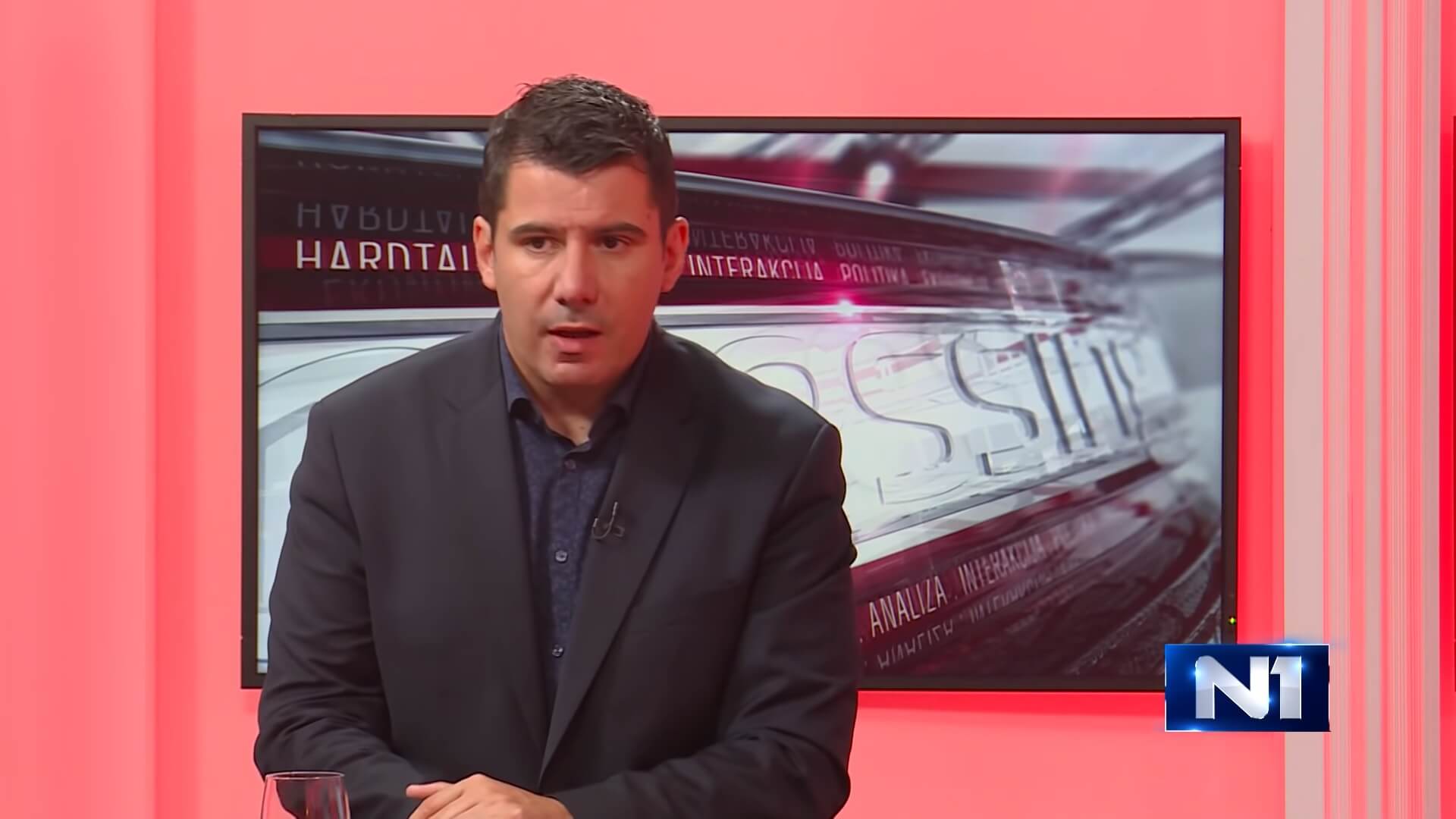
Nikola Grmoja, screenshot N1
The Law: "Gay is OK". Popular opinion: "Do it in your homes, not on the streets".
In this political escalation, what does the average Croatian think? Looking at the comments on social networks, it seems the majority of Croatians don't mind gays being gays and living how they like (even if they are not always happy with legal rights the LGBTQ community received). But, one sentiment in that „tolerance“ is particularly worrying.
„Live in your house however you want it. You don't have to wave around, like its a best thing ever“, said one of the online comments on Index.hr beneath the news on Petrov and Grmoja.
So it seems the public does not understand why Pride is important. First of all, as evident, the political climate is such that the battle for equality truly isn't over in Croatia, and Pride is the best way for the community to express what issues LGBTQ still face in Croatia. Additionally, pride month is also educational and supportive, and public presence show to other people who feel the same that they are not alone, as they might feel lonely and unable to find people who feel the same in everyday life.
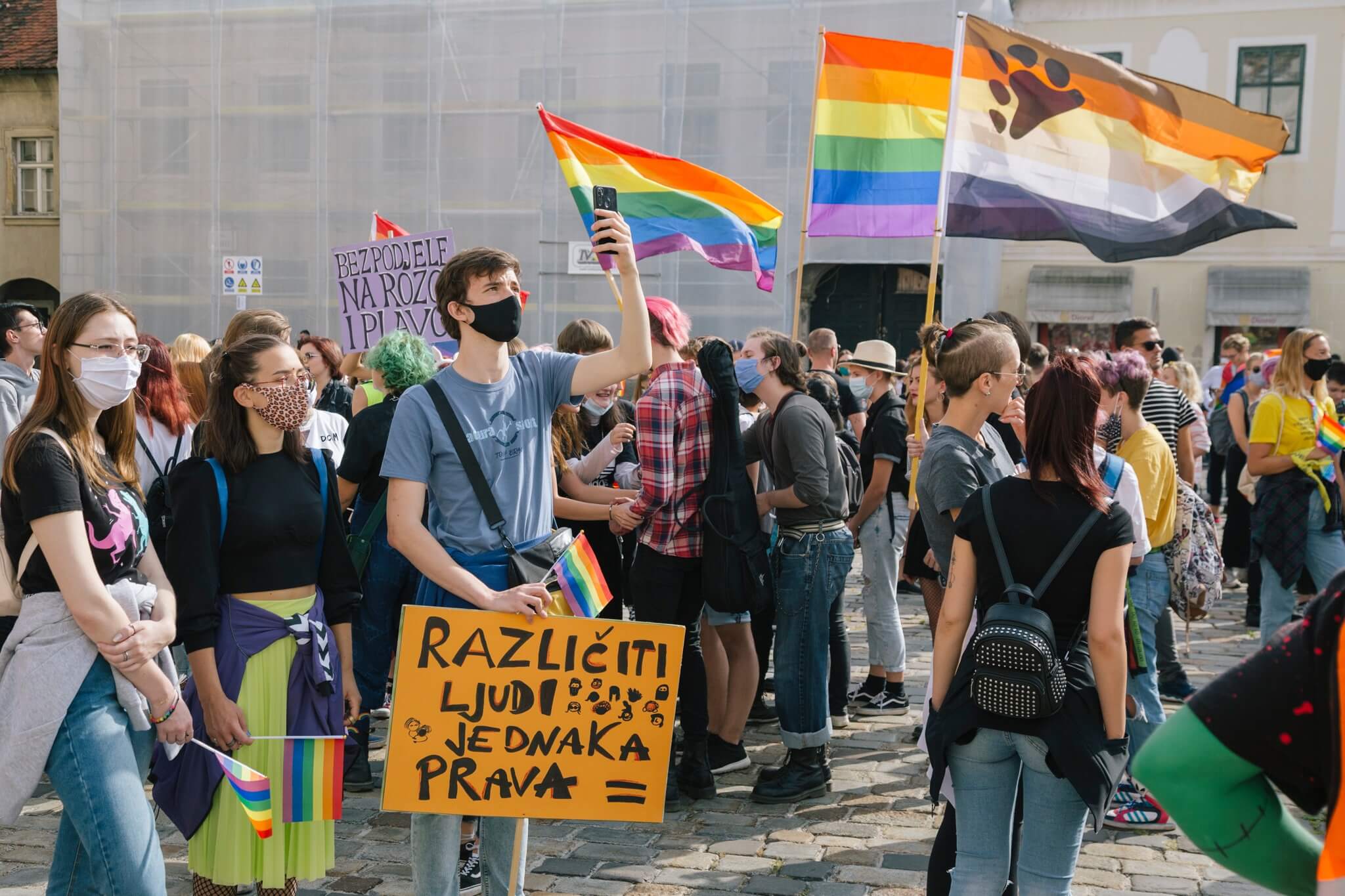
© Zagreb Pride
But, even if the law and constitution give the same rights and solves the problem of intolerance of LGBTQ people completely, does that mean that Pride should then be canceled? Well, Croatia won its independence and the war in the nineties. Does that mean we should stop commemorating the Homeland War? Or is it nice to honor and celebrate the victory and triumph over all obstacles Croatia had to face in its independence? Pride is a cultural, commemorative event honoring those who were or still are victims and oppressed for their sexual preference, either in Croatia or in the world. Croatia is a democratic country. Every group, national, ethnical, racial, religious, etc. should have the right to gather and honor its heroes. The right to gather and honor its tragedies and their dates and connect with other people who feel the same. If political elites are so concerned with keeping Croatians in Croatia, then they can't afford to discriminate or attack part of Croatian society solely based on their sexual preference. A preference that, unlike being violent or intolerable, can't be chosen.
Learn more about LGBT rights in Croatia and what LGBT tourists should know on our TC page.
For more about LGBT in Croatia, follow TCN's dedicated page.
Highlights of the Week: 5 Big Events in Croatia from June 28-July 4
June 3, 2021 - TCN's highlights of the week. A look at the events in Croatia from June 28 through the selection of TCN's reporter Ivor Kruljac.
EURO 2020 elimination and Dario Šarić in the NBA finals. Zagreb witnessing a series of arrests related to corruption of Milan Bandić's reign and explosive device planted in Split. In the midst of it all, is COVID-19 vaccination on its way to becoming obligatory and not optional? You may prefer the good news or the bad news, but here is both, as another week in Croatia comes to an end.
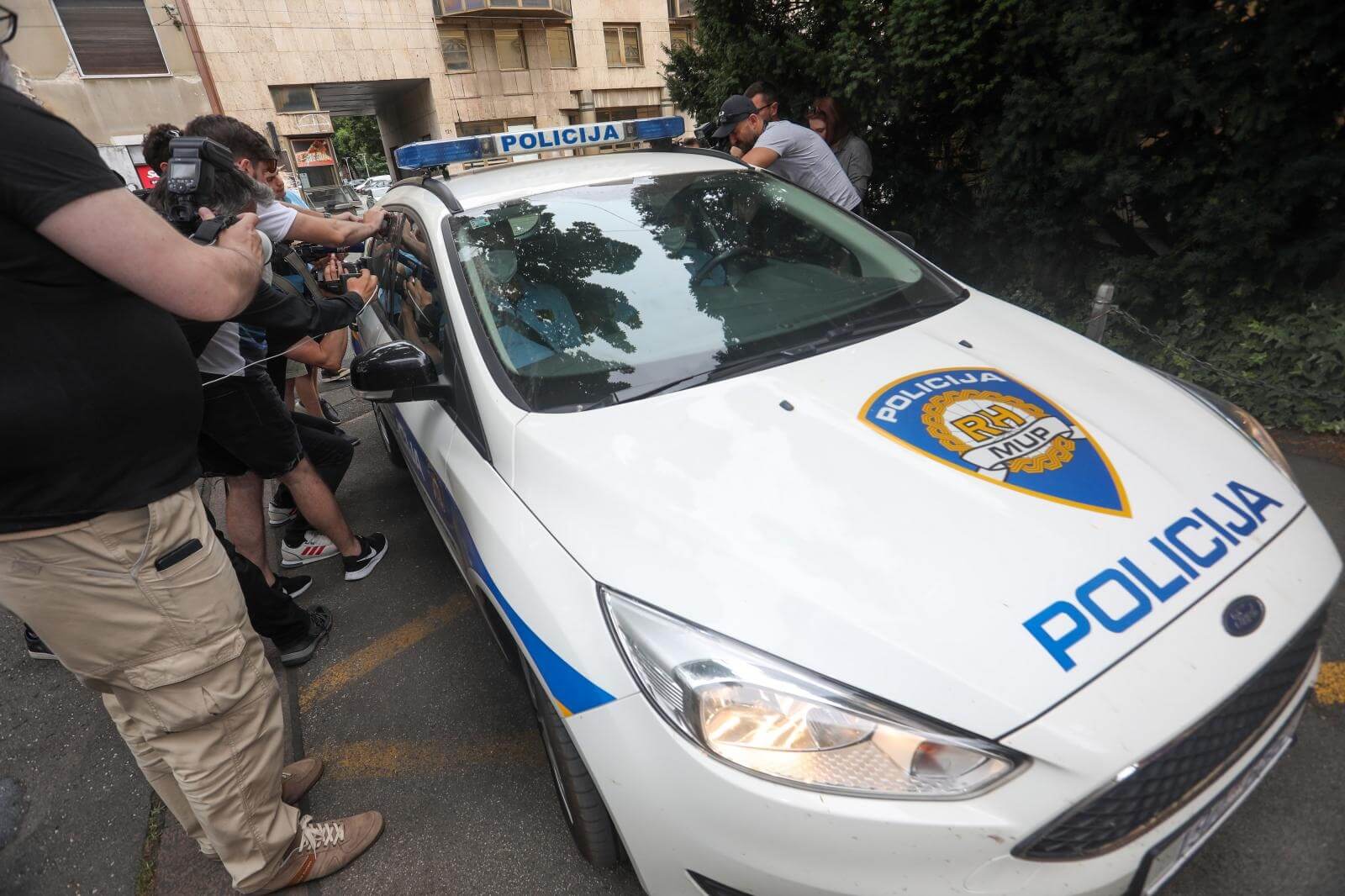
© Marin Tironi / PIXSELL
Highlights of the week: Uskok arresting Zagreb entrepreneurs and associates of former mayor Milan Bandić
The Office of Zagreb Mayor Tomislav Tomašević said on Wednesday that a preliminary investigation by members of the Office of the Chief State Prosecutor and the Office for Suppression of Corruption and Organised Crime (USKOK) started at the city administration offices at 6 am on Wednesday.
As TCN wrote, several people were arrested on suspicion of corruption, including the director-general of the HRT public broadcaster, Kazimir Bačić, Andrea Šulentić, and Ana Stavljenić-Rukavina. Both Šulentić and Rukavina were directors in Zagreb administration offices and close associates of former mayor Milan bandić. At the same time, details Bandić's heavy corruption (suspected and known publicly earlier) came to light.
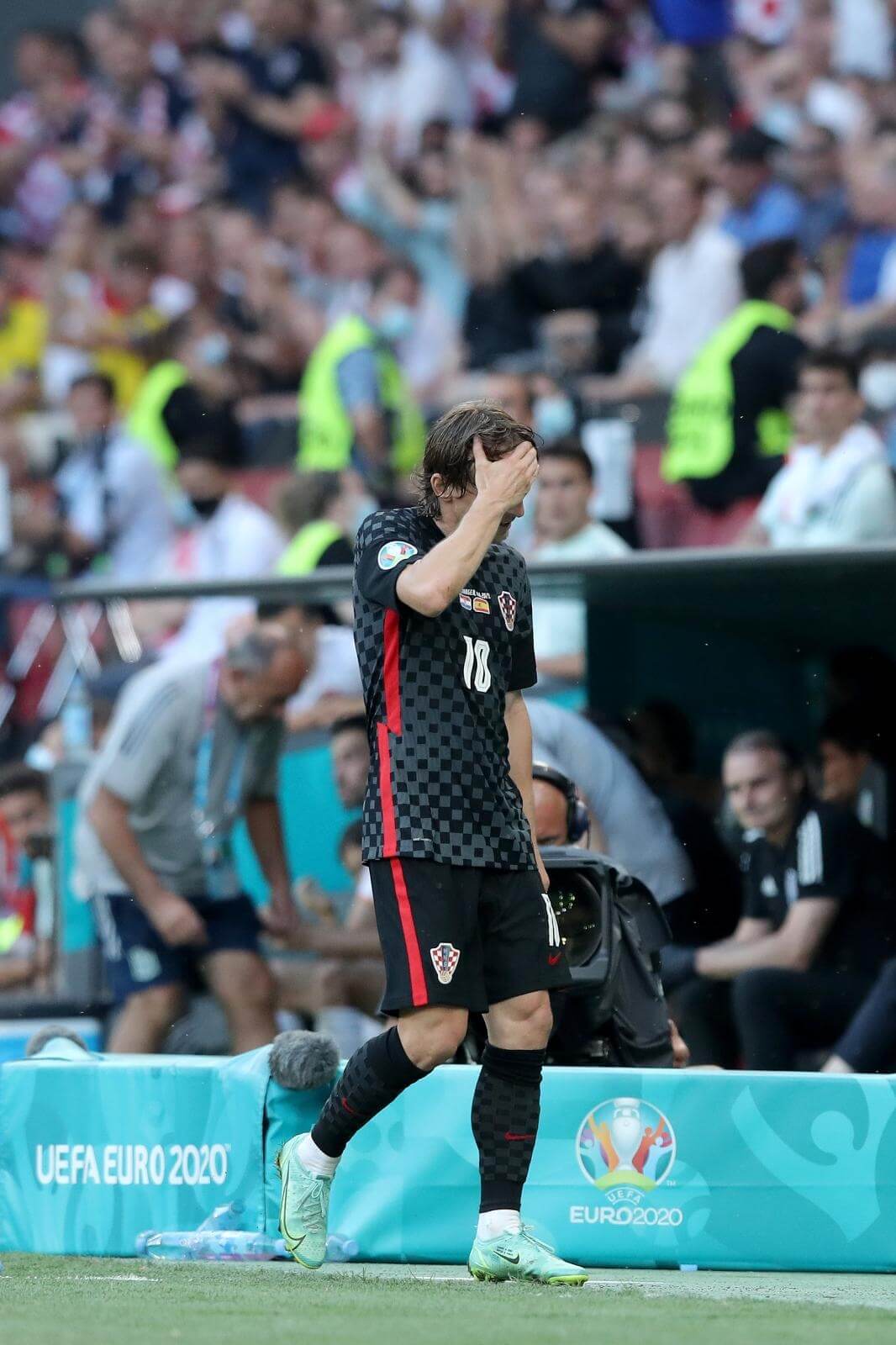
© Goran Stanzl / PIXSELL
Highlights of the week: Croatia eliminated from Euro 2020 after losing to Spain
Croatia and Spain met in Copenhagen on Monday for their EURO 2020 round of 16 match. It was a decent effort from Croatia, but not enough. Despite the Spain own goal in the 20th minute, the distraction as Rebić went to change his boots saw Spain even the score. The score towards the end of regular time went to 3:1 for Spain, but Croatia managed to lower to 3:2 and finally, in the added time, Pašalić scored for 3:3.
But, the euphoria was ruined for Croatia as in extra time, Morata earned Spain 4:3, and by 103rd minute, the total and final score was 5:3 for Spain. It was one of the more intense games on Euro so far as both teams show incredible spirit and persistence.
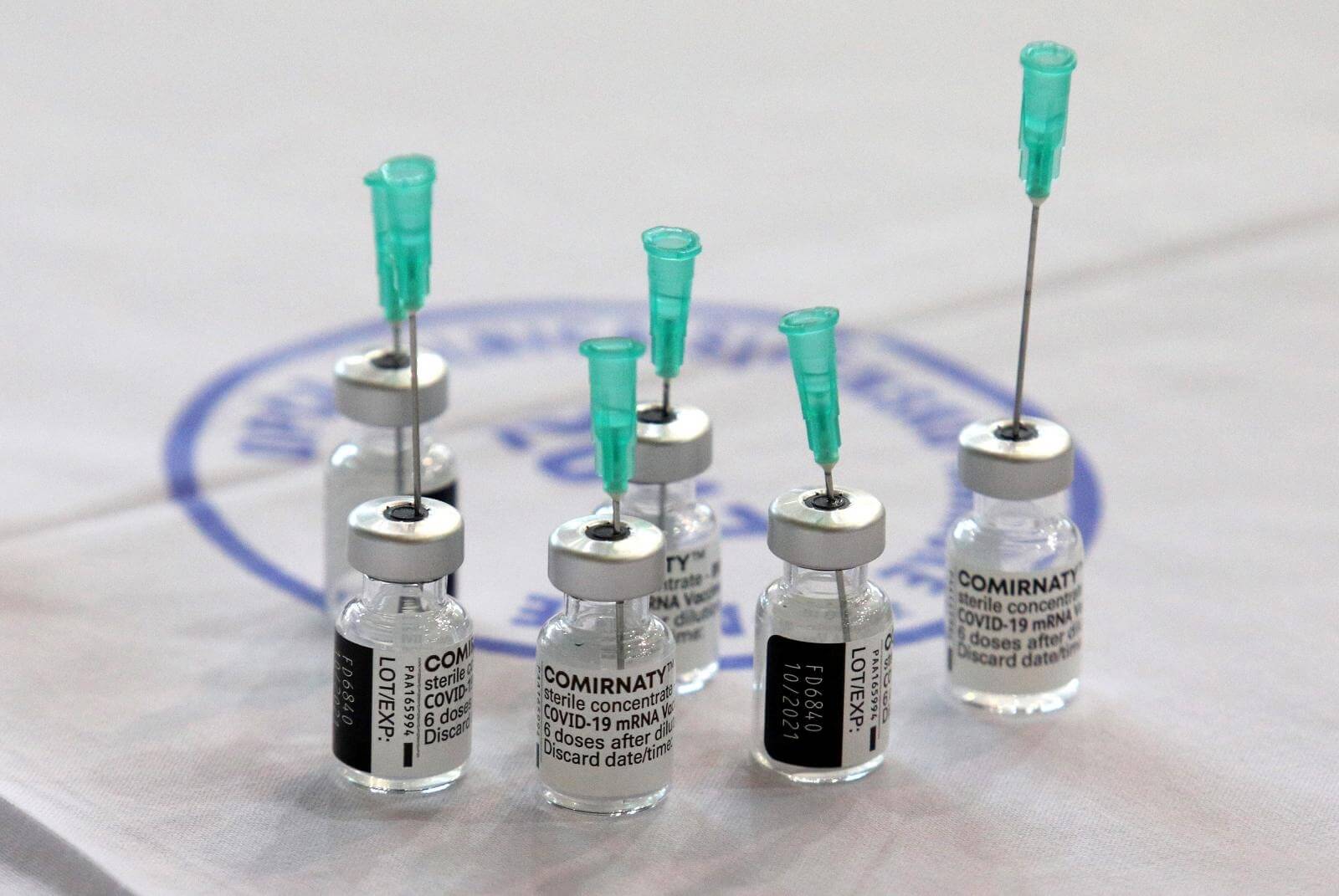
© Dusko Jaramaz / PIXSELL
Highlights of the week: Opposition parties against vaccination being required for job-keeping payments
The Social Democratic Party (SDP) called on Prime Minister Andrej Plenković on Thursday not to make vaccination a requirement for job-keeping payments, while the Most party said business owners were being blackmailed into vaccination.
As TCN reported, SDP leader Peđa Grbin elaborated his dissatisfaction via social networks.
"In Croatia, mandatory vaccination is possible, but the obligation is first established under the law on the protection of the population and then regulated and worked out under Immunisation Rules and the Mandatory Vaccination Programme. The obligation of vaccination can't be imposed in another way, notably not by linking support for entrepreneurs with vaccination," SDP president Grbin posted on Facebook.
"Most is against entrepreneurs, who are being forced into vaccination through blackmail, saving the government's mindless epidemic policy", stated the Most party on its official Twitter account. They added that Croatia was stuck with over 300,000 surplus vaccines because of poor government moves and communication omissions.
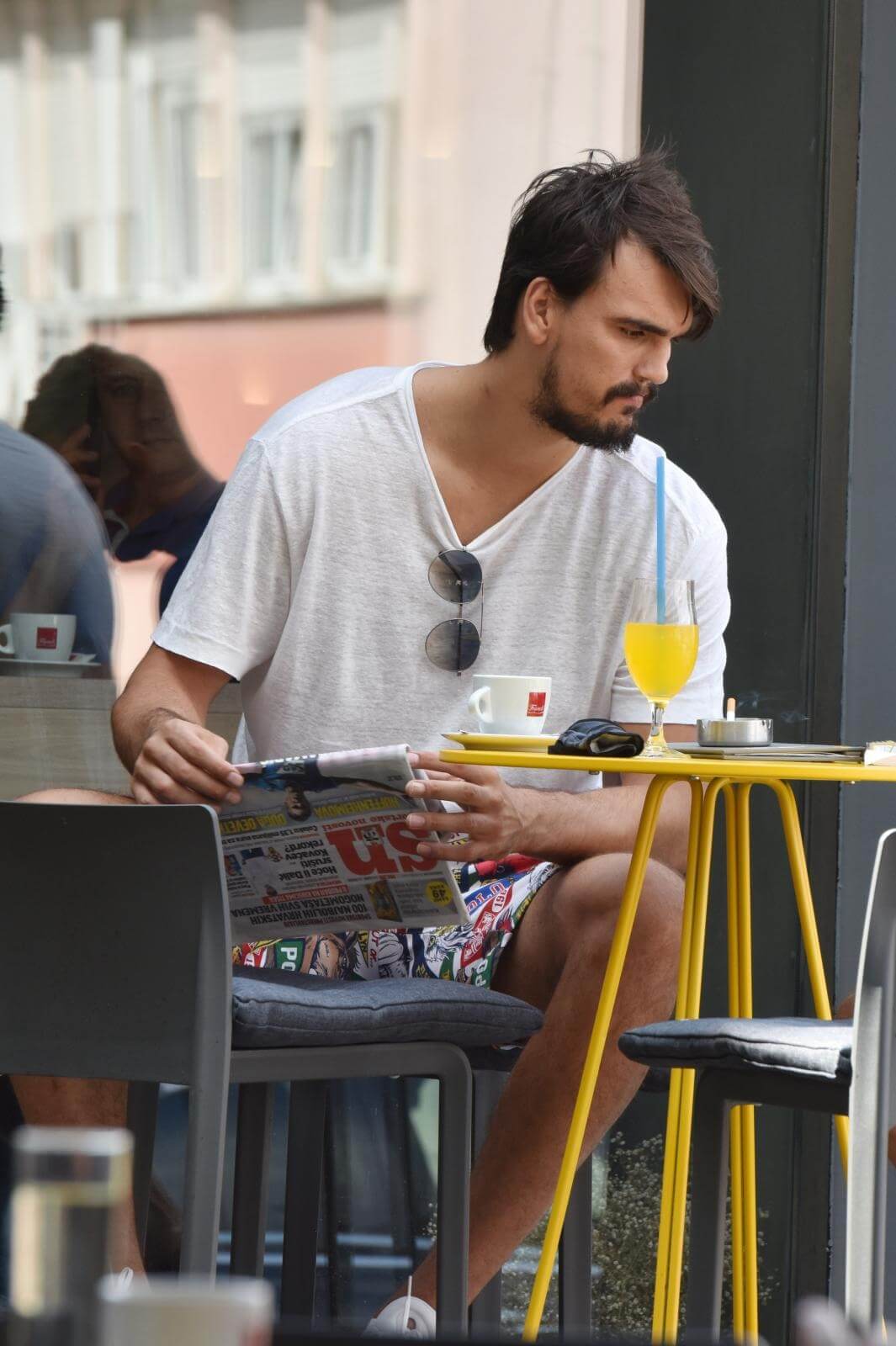
© Hrvoje Jelavic / PIXSELL
Highlights of the week: Dario Šarić becomes 5th Croatian basketballer in the NBA finals
Šibenik's Dario Šarić is the 5th Croatian basketball player to reach the NBA finals! As TCN wrote, Šarić became only the fifth Croatian basketball player in the NBA league finals, joining the company of Dražen Petrović, Toni Kukoč, Žan Tabak, and Ante Žižić. Šarić plays for Phoenix Suns. They topped the Los Angeles Clippers 4-2 in the NBA Western Conference Finals. Apart from basketball, Šarić also likes to enjoy sipping coffee on Šibenik cafe terraces, as portrayed in the photo.
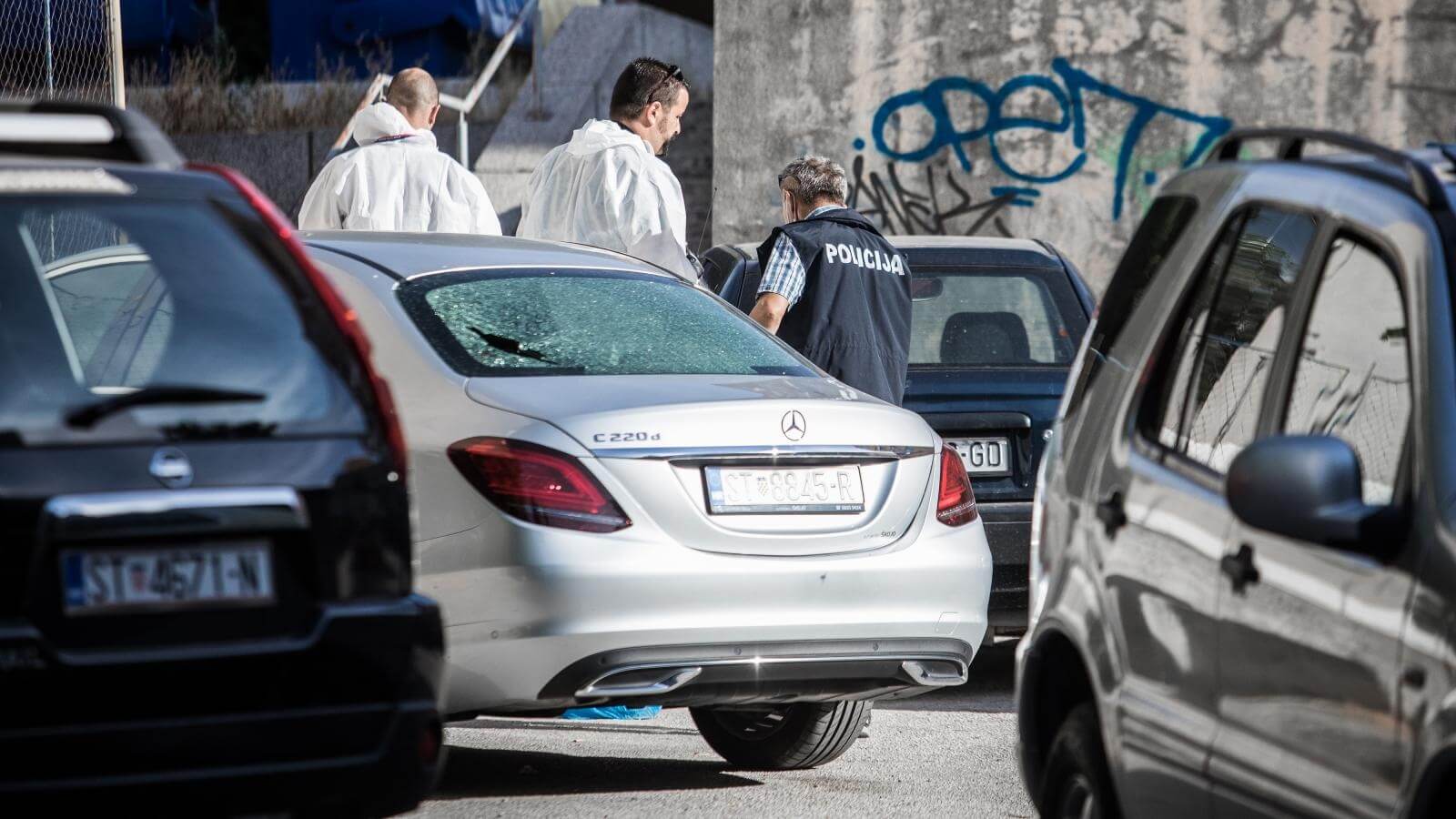
© Milan Sabic / PIXSELL
Highlights of the week: Bomb planted in Split. One person injured
In the night from Thursday to Friday, an unknown person placed an explosive device underneath a vehicle. The explosion damaged six cars, and one person required medical attention. The investigation is ongoing since Friday morning.
To learn more about Croatia, have a look at our TC website.
For more about news in Croatia, follow TCN's dedicated page.
Opposition: It's Not Good That PM Plenković is Trying to Intimidate Media
ZAGREB, 2 June, 2021 - Recent frequent attacks on media, reporters and political analysts by Prime Minister Andrej Plenković were met on Wednesday with condemnation by opposition MPs, who called on him to accept criticism and on media not to allow to be intimidated.
Social Democrat Arsen Bauk said the prime minister had opted for the "attack is the best form of defence" approach.
"Some defeats at local elections are painful for the HDZ, notably the prime minister, because he chose or imposed some of the candidates. It is not good for the prime minister, who has both objective and real power, to try to square accounts with or intimidate reporters, media and their editors and owners. I hope you will not let yourself be intimidated by him," Bauk told reporters in the parliament.
Judging by their response, I can see that they are not intimidated, he said, adding that he was fascinated by Plenković's claim that rival broadcasters had colluded to devalue the HDZ's candidate for Zagreb mayor.
Stephen Bartulica of the Homeland Movement said that media were possibly responsible for the latest developments because they had been very mild towards Plenković from the start.
"I definitely support media freedoms and it is not unusual that media in Croatia and the rest of the world are leaning to the left, but I think that what is more important here are the so-called independent analysts who often have material interests and certain relations with political camps and NGOs and who act in public as if they were unbiased," said Bartulica.
The sole MP of the Reformists party, Natalija Martinčević, who chairs the parliamentary Media Committee, said that the prime minister was very nervous, which she considers inappropriate.
"Communication with the media must be civilised. We are all expected to behave that way and so is the prime minister. There is no justification for his behaviour," she said.
Most MP Marija Selak Raspudić said that media had been the PM's fetish for a long time.
"Let me remind you of his high school graduation thesis 'Means of Mass Communication' in which, apart from extensively quoting (Yugoslav Communist politician Edvard) Kardelj and Marx, he also says that the Party is the one to control all information in society. He then advocates some democratic trends and says that media should be democratised, but it seems that as an experienced politician he has accepted the principle that the Party should control all information and is surprised when he does not manage to do it," said Selak Raspudić.
HSLS MP Dario Hrebak said that every politician had their own style of communication, noting that the prime minister was evidently irritated by something.
"I, too, am sometimes unhappy with the media but everyone has the right to say what they think, I would not be a liberal if I thought differently," he said, adding that he believed the prime minister would mend his relationship with the media and some reporters.
aFor more about politics in Croatia, follow TCN's dedicated page.
Highlights of the Week: 5 Big Events in Croatia from May 17-23, 2021
May 23, 2021 - TCN's highlights of the week. A look at the events in Croatia from May 17 through the selection of TCN's reporter Ivor Kruljac.
From Local elections to released details of the Euro 2020 championship strategy to the release of Zoran Mamić. Add Besana company attempting to boost its position in Croatia, and you have a truly exciting week. Here are the highlights.
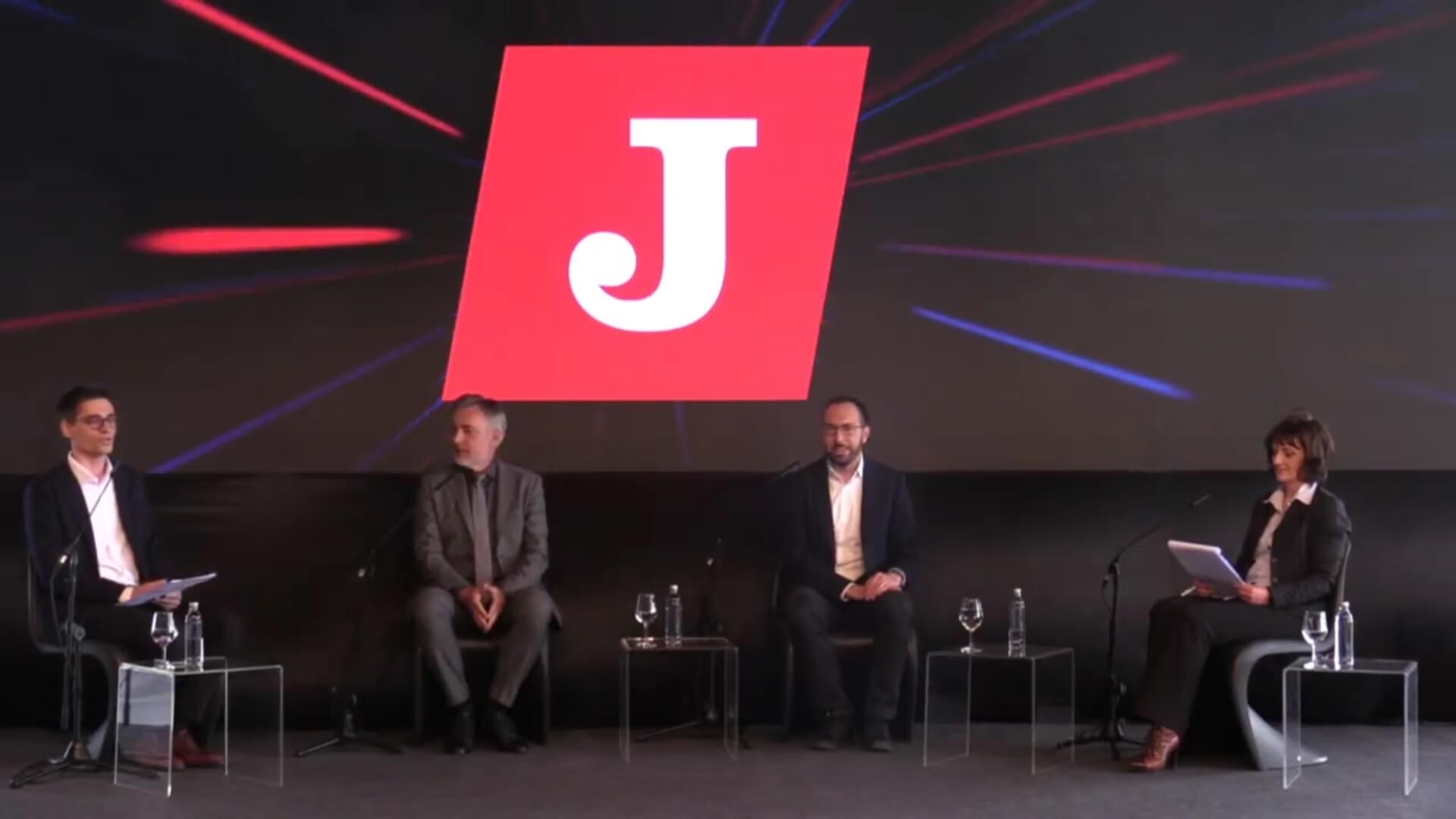
screenshot / Jutarnji list
Highlights of the Week: Zagreb mayor candidates Tomašević and Škoro had a debate ahead of the second round of elections
Jutarnji List invited on Friday mayoral candidates Miroslav Škoro (Homeland Movement), and Tomislav Tomašević of the green-left party We Can! to debate ahead of new elections.
In the first round of the elections, We Can! earned 147.631 votes (45.15%), while Homeland Movement had 39.789 votes (12.16%). Before officially entering the second round, Škoro declared Tomašević and We Can! party extreme left and pushed the narrative of elections as an ideological referendum among right-wing and conservative circles. Škoro also accused We Can! of being foreign mercenaries working for a philanthropist George Soros or wanting to revitalize Yugoslavia and Škoro's associate Zlatko Hasanbegović earlier in the week called We Can! a lesbian syndicate. Additionally, Nikola Grmoja (Most Party) stated for N1 that We Can! are Soroshians and accusations of their weird name-calling saw a random generator on the internet designed to mock these terms by random options of name-calling. Meanwhile, Tomašević continued the campaign talking about solutions to the problems Zagreb is currently facing but occasionally makes remark accusations while keeping it clean. The debate on Jutarnji List saw similar rhetoric from both candidates in their public performances, and overall, at least for the people of Zagreb, May 30 can't come soon enough.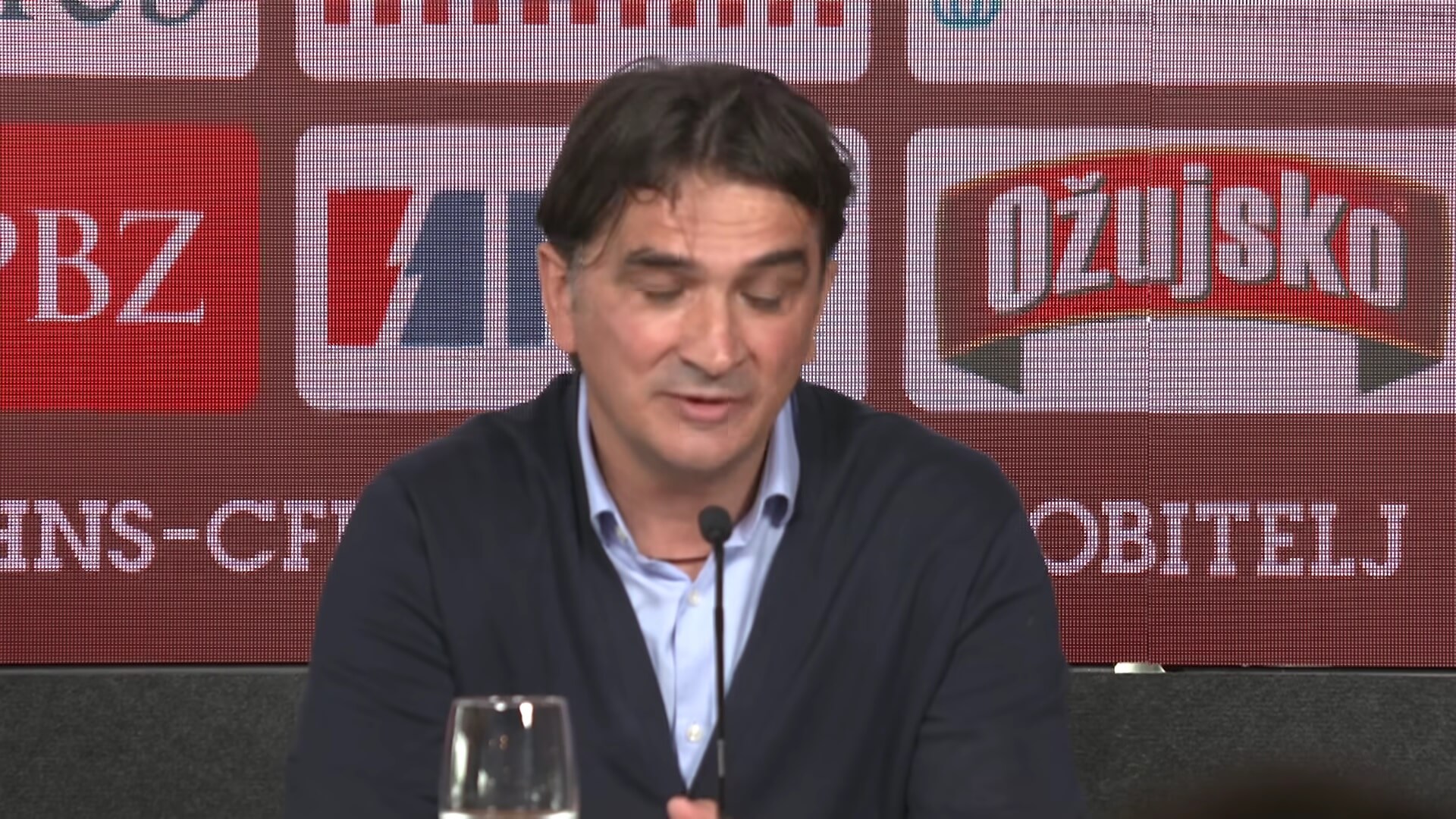
screenshot / Hrvatski nogometni savez
Highlights of the Week: Zlatko Dalić announces preliminary EURO 2020 Croatia player list
Coach Zlatko Dalic has announced the preliminary EURO 2020 Croatia player list on Monday. Luka Modrić (Real Madrid), Marcelo Brozović (Inter), Milan Badelj (Genoa), Mateo Kovačić (Chelsea) are some of the names that made it on the list.
The Croatia national team has entered the last month of preparations for the European Championship, which opens on June 13 at Wembley against England at 3 pm.

screenshot / RTL
Highlights of the Week: Zoran Mamić released from custody
Former Dinamo football coach Zoran Mamić will remain free while in Bosnia and Herzegovina; however, he will have to report to the police once a week, and his personal documents have been temporarily confiscated, the court in Bosnia and Herzegovina decided on Wednesday.
Zoran Mamić was arrested early Wednesday morning by officers from the State Investigation and Protection Agency (SIPA) based on an arrest warrant issued against him in Croatia.
After that, Mamić was handed over to the court in Sarajevo. Judge Branko Perić determined his status, including his citizenship of BiH. The judge ruled that Mamić would remain free with precautionary measures and was ordered to give in his personal identification documents.
The court did not discuss the matter of Mamić's extradition, considering that Croatia has not sent a formal request yet.
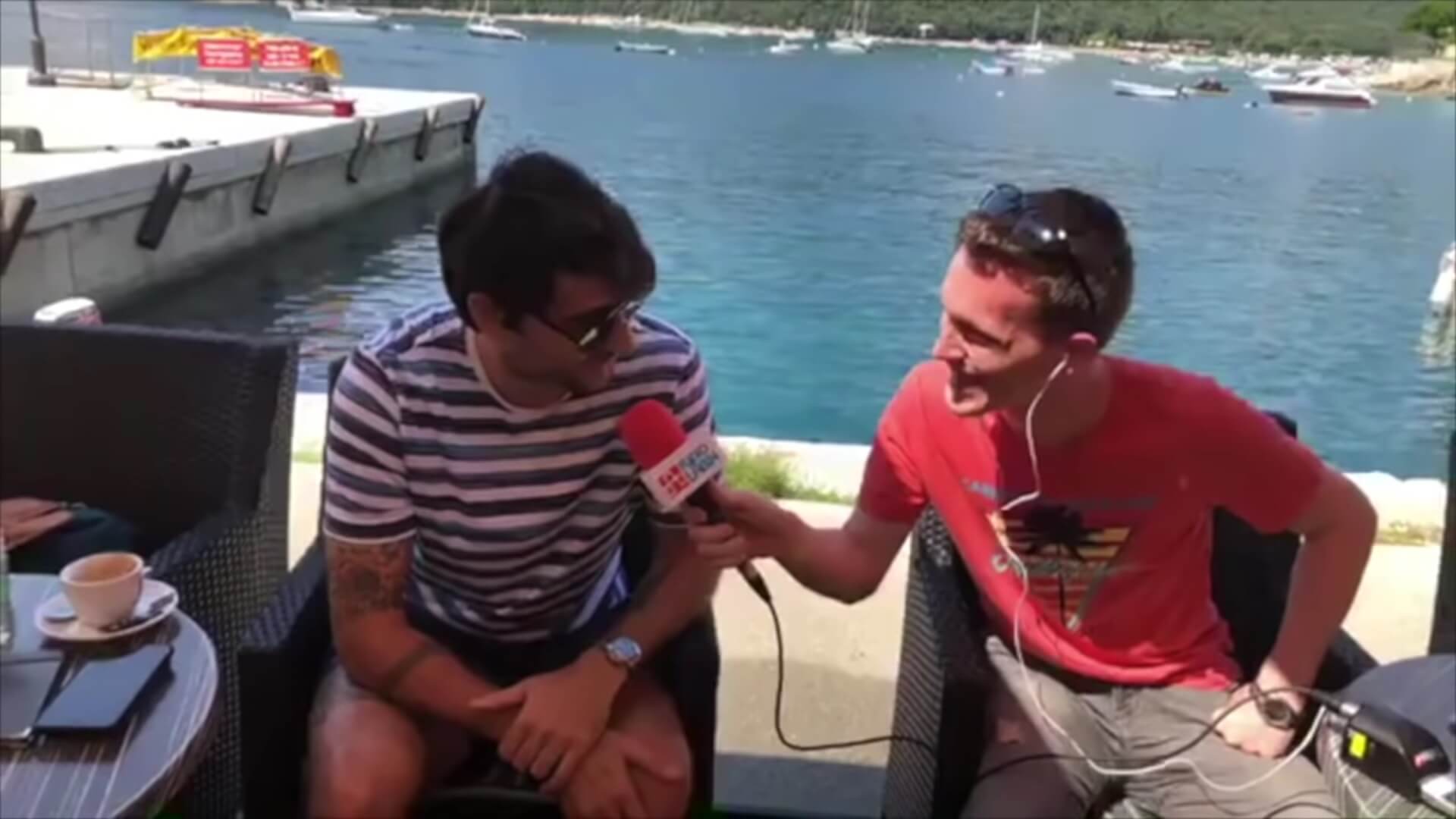
screenshot / Radio Labin
Highlights of the Week: Former football player Vedran Ćorluka new Croatian assistant coach
The new Croatia national team assistant coach Vedran Ćorluka was officially presented by coach Zlatko Dalić at a press conference in Zagreb ahead of EURO 2020.
Although there was a lot of speculation, Croatian football player Vedran Ćorluka officially announced the end of his playing career and was confirmed as the new Croatia assistant coach on Monday.
"I did not plan it, but the moment has come," said Ćorluka at the press conference at which coach Zlatko Dalić presented the list of players for the upcoming European Championship.

Pixabay
Highlights of the Week: Italian company Besana strengthening position in Croatia
The Italian company Besana, which is otherwise one of the strongest European companies in the production and processing of nuts and dried fruit, is working to further strengthen its position here in Croatia.
As TCN reported on Monday, the Italian company Besana currently has 50 subcontractors located in Croatia, from whom it buys about 100 tonnes of hazelnuts per year. But, much more can be expected if their plans go well.
To learn more about Croatia, have a look at our newly launched TC website.
For more about news in Croatia, follow TCN's dedicated page.
Opposition Parties File Motion of No Confidence in Health Minister Vili Beroš
ZAGREB, 4 May, 2021 - Parliamentary opposition parties have filed a joint motion for a vote of no confidence in Health Minister Vili Beroš over the accumulated problems in the healthcare sector and scandals related to the minister, Social Democratic Party (SDP) leader Peđa Grbin said on Tuesday.
"The reasons for this move are clear to all citizens - the accumulated debts in the healthcare system resulted in the suspension of deliveries of medicines to hospitals at the height of the pandemic. There are also huge problems with the vaccination system, and we have learned of favourable treatment in the development of the cijepise.hr vaccination registration system," Grbin said.
"The development of this non-functioning system was awarded to people connected with Minister Beroš. There are also suspicious public procurement procedures at the Health Ministry such as one where IT services were awarded to a florist and tenders were fixed for former HDZ health ministers Andrija Hebrang and Neven Ljubičić, which have been cancelled but only after media started writing about them," he added.
"The Health Ministry is simply not functioning. There are no reforms, and the extent to which this affects people's lives could best be seen in a recent case at the Clinic for Tumors where citizens suffering from malignant diseases could not receive adequate care," Grbin said, naming Beroš as the person most responsible for this.
"We want Beroš to go because right now he has done nothing positive for the healthcare system, and all the negative things he has done pose a direct threat to people's health and lives," the SDP leader said. "His departure, however, will not be enough and we will all have to come to grips with the accumulated problems together."
Grbin said that a discussion on Beroš must be held within 30 days, and whether it will be held before or after the 16 May local elections "depends on Prime Minister Andrej Plenković and Parliament Speaker Gordan Jandroković."
The initiative was signed by all opposition groups in parliament except the Croatian Sovereignists, but they have announced that they will vote in favour Beroš's resignation, Grbin said.
MOST's Nikola Grmoja said that his party had been warning for a long time about the problems faced by the healthcare system, including huge debts to drug wholesalers and long waiting lists.
"Beroš, of course, is not the only one to blame, the whole government is responsible. With our signatures we also want to encourage a reform of the healthcare system. All of us in the opposition agree that changes are necessary and should be launched urgently," Grmoja noted.
Sandra Benčić of the green-left We Can! platform said that they supported all the reasons for a no-confidence vote in Beroš, but stressed that the responsibility for the crisis in the healthcare system and the poor management of the coronavirus pandemic mostly lay with Prime Minister Andrej Plenković.
"None of the ministers, and certainly not Minister Beroš, makes decisions on their own. They were not chosen as competent persons in their departments but were chosen based on their loyalty to the prime minister who ultimately makes all decisions. The prime minister cannot be exonerated by his purported unawareness of the scandals for which we seek Beroš's resignation. That's why we ask whether the country can be run by a prime minister who does not know or who does not get key information," Benčić said.
Homeland Movement MP Stjepo Bartulica said that the Croatian healthcare system was too politicised. "There are countless problems and the possible resignation of Minister Beroš will not change things much. We have insisted from the start that the healthcare system should be governed by market principles because now we don't see any mechanisms that will bring about change to the system as this government resists structural reforms," he said.
For more about politics in Croatia, follow TCN's dedicated page.


